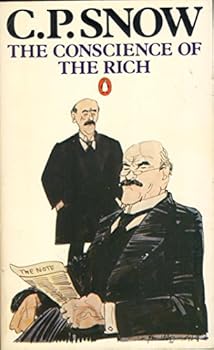The Conscience of the Rich
(Book #3 in the Strangers and Brothers Series)
Select Format
Select Condition 
Book Overview
Seventh in the Strangers and Brothers series, this is a novel of conflict exploring the world of the great Anglo-Jewish banking families between the two World Wars. Charles March is heir to one of... This description may be from another edition of this product.
Format:Paperback
Language:English
ISBN:0140015264
ISBN13:9780140015263
Release Date:January 1970
Publisher:PENGUIN BOOKS LTD
Length:336 Pages
Weight:0.46 lbs.
Dimensions:4.7" x 7.1"
Customer Reviews
2 ratings
Fastidious
Published by Thriftbooks.com User , 17 years ago
The primary characters of the story are Charles, upright, principled, gifted and his father, Leonard March, a proud and fastidious patriarch. Mr. March's fussiness verges on the neurotic. At the bar exam Lewis Eliot, the narrator, sees Charles March. Lewis confesses to Charles that he is nearly out of funds. The exam results are of great importance to Lewis. It is 1927 and both men are twenty-two. In chambers Lewis is underworked and overanxious. Herbert Getliffe, Lewis's mentor, has a compendious but fuzzy memory. Visiting the March family, Lewis learns that Mr. March has near total recall. The Marches had never known a poor young man. Lewis does not understand for a long time how eminent the family is. Charles argues his first case with drive and clarity. He loses the case but the judge pays a compliment. Francis Getliffe knew Charles at Cambridge. He stays with the family for a week and later becomes the husband of Charles's sister, Katherine. The Marches used to have a bank. Members of the family have joined parliament. Everything in English life has become available to members of the family. Mr. March becomes very distressed when Charles endeavors to quit the practice of law. His brothers and sisters are scandalized. Charles takes charge of Lewis's career. After being taken to a party by Charles, Lewis receives a brief. Then he gets another case. Mr. March seems to recreate himself in his son. When the family bank was sold, Mr. March retired at age thirty-two. He feels that he had been too shy and anxious. He has come to live enirely in the family. When Charles decides to become a doctor his father does not understand. Charles has a social conscience, he feels guilt, he desires to be useful. He seeks what is good in order to be good. At the time of the celebration of Mr. March's seventieth birthday it is 1936. After Charles and his wife fail to block a political newspaper from making unfounded accusations against government officals and his own uncle is sacked as a consequence, his father cuts off contact. Mr. March continues to entertain Lewis Eliot and others. This is one of the more rewarding volumes of the STRANGER AND BROTHERS series.
no title
Published by Thriftbooks.com User , 18 years ago
"The phrase that the old Japanese used to describe the love of parents for their children was a darkness of the heart." The last parts of this book made me want to weep. A very sad novel. But magnificent nonetheless, like "The Dollmaker" by Harriet Arnow. Every bit as compelling as "Time of Hope", the first in chronological order in the "Strangers and Brothers" series. But it seems to me there might be one flaw; if Ann loved Charles as Eliot thought she did, how could she let herself be the cause of this chasm between Charles and his father? She left the choice to her husband, but why didn't she simply act on her own? Eliot seems to imply that her nature was to subjugate herself to Charles, but she had the power to save her husband so much pain. The implication being, that she loved the "Note" more than Charles, and Lewis is wrong.





